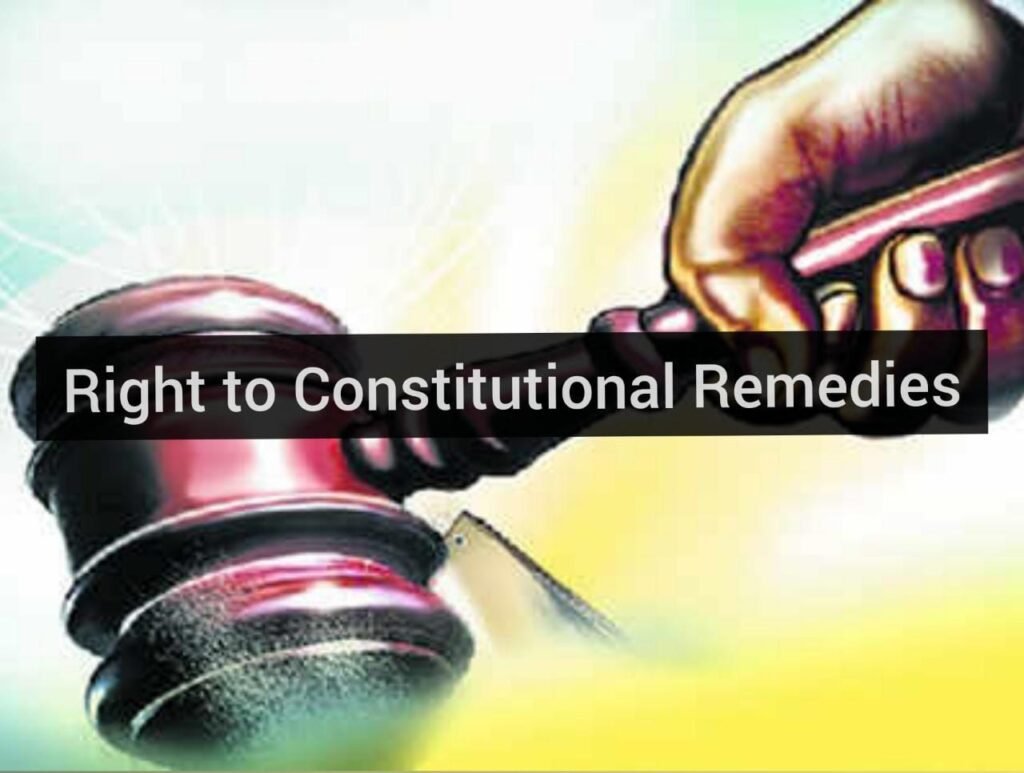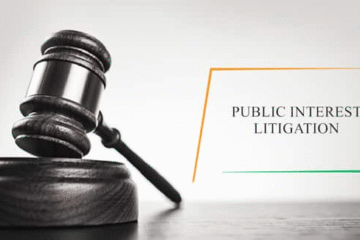
Writ – An individual has right to move to the Supreme court (under article 32) or under Article 226 to High court in case his fundamental rights are violated, and the supreme court and high court may issue appropriate writs to enforce such rights
In English, Law writs are known as Prerogative writs. These writs are extraordinary remedies intended to be applied in exceptional cases in which ordinary legal remedies are not adequate. Thus, SC & HC have power to grant the remedy of nature obtainable in the court of king’s Bench in England by means of the Prerogative writs[1].
Prerogative writs: – In English Law, the Prerogative writs are class of writs originally available to the crown, but which were later made available to the king’s subjects through the courts. The Prerogative writs are a means by which the crown, acting through its courts, affects control over inferior courts or public authorities throughout the kingdom.
Article 32: – Right to constitution Remedies
The fundamental right is enriched in part III of our constitution from article 12 to Article 35. But these rights cannot be enforced properly unless a guarantee is available to protect these rights so to make these rights meaningful, there needs to be effective machinery for their enforcement.
Article 32 is the soul, heart, protector & guarantor of the constitution, it is already a fundamental right that provides us to move supreme court, in case of violation of fundamental rights.
Same Article 32 gives power to the supreme court to issue writes for filled writs petition in response. As per this.
(1) Right to move supreme court by appropriate proceeding for the enforcement of rights conferred by this part.
(2) Gives powers to the supreme court to issue Direction/order or writs
(3) Parliament may by law empower any other court
(4) This right cannot be suspended except as otherwise provided by the constitution.
Article 226 – Same power as Article 32, to issue Directions/orders or writs is given to High Court, throughout the territories in relation to which the High Court exercise is its jurisdiction.
In the case of Union of India v/s Paul Manickam[2], a Person may directly approach the supreme court in case of violation of Fundamental Rights. But has to be shown by the petitioner as to why the high court has not been approached.
Difference between Article 32 & Article 226
| Article 32 | Article 226 |
| Power to Supreme court, only for the enforcement of the fundamental right | Power to the high court, for enforcement of Fundamental right including other purposes (Example: – Other constitutional rights) |
| Narrower Jurisdiction Area | Wider Jurisdiction area |
| Article 32, it’s a fundamental right, hence the supreme court may not refuse to exercise its writs jurisdiction due to it is the defender or guarantor of fundamental rights. | The remedy under article 226 is discretionary power. The high court may refuse to exercise its jurisdiction. |
There are five types of writs available: –
- Writ of Habeas Corpus
- Writ of Mandamus
- Writ of Prohibition
- Writ of Certiorari
- Writ of Quo- Warranto

Writ of Habeas Corpus: –
- It literally means to “Have a body of”
- Used to release a person who has been unlawfully detained or in prison.
- If the Court Concludes, the detention was unlawful, then it directs the person to be released immediately.
- The writ can be filed by a detained person himself or his relatives or friend.
- It can be issued against both public authorities and individuals.
In the following case, this writ cannot be filed: –
- Lawful detention
- Contempt of court
- Detention ordered by a competent court.
Writ of Mandamus: –
- It literally means “we command”
- It can be issued by the court to
i. Public officials
ii. Public corporation
iii. Tribunal
iv. Inferior court, or
v. The government to perform the legal duty which he has not or refused to perform.
But, cannot be issued against: –
(i) Private Individual or body
(ii) The president or state’s governor
(iii) Chief justice, if they work in a judicial capacity
(iv) Non statutory function.
Writ of Prohibition: –
- It means to forbid/ stop/ stay
- It is issued by a court to prohibit the lower court, tribunals & other quasi-judicial authorities from doing something beyond their authority when they try to transgress the limits or power vested in it.
- For Ultra-vires Acts, or acts without jurisdiction.
Against whom, it cannot be filed: –
- Administrative authority (eg- District collector)
- Legislative Bodies – Individual or bodies
Writ of Certiorari: –
- Literal meaning “to certify”
- When the court is of the opinion that a lower court or a tribunal has passed an order, which is beyond its power or committed an error of law.
- It may transfer the case to itself or quashed the order by a lower court or Tribunal.
The main difference between prohibition & certiorari, is they are issuing on different stages (prohibition before the case is heard & decided, Certiorari after the case is heard & decided)
Writ of Quo Warranto: –
- Its literary meaning, By what warrant.
- By this, the court calls upon a person holding a public office to show under what authority, he holds that office.
- Cannot be issued with respect to a private office
- The term of the public office must be of permanent in nature.
[1] https://www.law.cornell.edu/wex/prerogative_writ
[2] AIR 2003 SC 4622





0 Comments